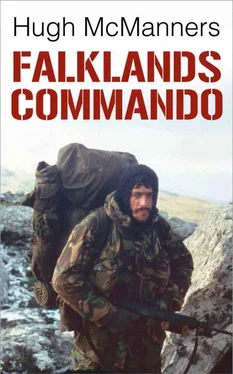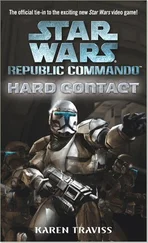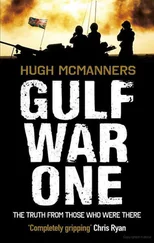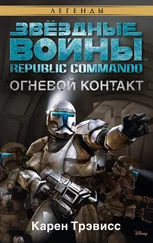Hugh McManners - Falklands Commando
Здесь есть возможность читать онлайн «Hugh McManners - Falklands Commando» весь текст электронной книги совершенно бесплатно (целиком полную версию без сокращений). В некоторых случаях можно слушать аудио, скачать через торрент в формате fb2 и присутствует краткое содержание. Город: London, Год выпуска: 2014, ISBN: 2014, Издательство: Nightstrike Publishing, Жанр: nonf_military, Биографии и Мемуары, на английском языке. Описание произведения, (предисловие) а так же отзывы посетителей доступны на портале библиотеки ЛибКат.
- Название:Falklands Commando
- Автор:
- Издательство:Nightstrike Publishing
- Жанр:
- Год:2014
- Город:London
- ISBN:978-0-992-81540-0
- Рейтинг книги:4 / 5. Голосов: 1
-
Избранное:Добавить в избранное
- Отзывы:
-
Ваша оценка:
- 80
- 1
- 2
- 3
- 4
- 5
Falklands Commando: краткое содержание, описание и аннотация
Предлагаем к чтению аннотацию, описание, краткое содержание или предисловие (зависит от того, что написал сам автор книги «Falklands Commando»). Если вы не нашли необходимую информацию о книге — напишите в комментариях, мы постараемся отыскать её.
Falklands Commando — читать онлайн бесплатно полную книгу (весь текст) целиком
Ниже представлен текст книги, разбитый по страницам. Система сохранения места последней прочитанной страницы, позволяет с удобством читать онлайн бесплатно книгу «Falklands Commando», без необходимости каждый раз заново искать на чём Вы остановились. Поставьте закладку, и сможете в любой момент перейти на страницу, на которой закончили чтение.
Интервал:
Закладка:
The army then slipped back into its old ways, which even today still play a part in the way some individual regiments select new officers. The army’s formal officer aptitude selection (the Regular Commissions Board) is regarded by the smarter regiments as merely one of various inconvenient hoops through which the individuals they have chosen must jump. The Guards and Household Cavalry, in particular, choose only from the ‘gentry’, giving weight to family pedigree and existing family ties with the regiment. Today, psychologists do not play an active part in officer or soldier selection, although psychological tests are widely used and military staff may have some psychological training. During officer selection for the SAS, an anonymous psychologist is reputed to sleuth around the officers’ mess eavesdropping on the conversations of candidates, but his views would certainly not be afforded anything like the same emphasis as those of the selection course instructors.
The Regular Commissions Board – now known as the Army Officer Selection Board (AOSB), takes three days and is partly physical, looking for the potential to become an officer. The individual assault course is a particularly interesting test of fitness, agility and strength, cleverly coupled with judgement and quick thinking. There are also group discussions, written papers, interviews and psychological tests, all carefully observed by Board selection officers. The RCB looks for a type of leadership described by sociologists as ‘leader-centred’. It believes in what it calls ‘natural leadership’ (a stereotype very clearly understood by Board staff), selecting those who are able to alternate easily between leading and following; as all military leaders, regardless of seniority, must take orders from someone else. The RCB tends to reject democratically inclined leaders as ‘not hard enough’ or ‘indecisive’. ‘Positive’ candidates are preferred, the sort who might push others aside in their keenness to lead. According to von Zugbach, autocratic and authoritarian personalities are favoured. Precocious types tend to fare badly, being judged immature, perhaps being invited to try again in a year or so.
According to another categorisation of leadership, into Types A and B, the Regular Commissions Board selects Type A leaders – the noisy, extrovert, authoritarian ones – while discounting Type B leaders, who are quiet, thoughtful and inward-looking, leading quietly and without fuss. Several studies show that in the stress of combat, Type A leaders tend to become subdued to the point where their leadership is ineffective, whereas Type B leaders continue quietly as they had always done, in the process drawing their men even closer to them, increasing the effectiveness of their leadership. The combat experience of many individuals to whom I have spoken corroborates this. RCB selectors like robust, outward-looking people, who engage in tough, manly activities. In sociological terms, they exercise ‘anti-intraception’, disliking introspection and tender-mindedness in candidates (as might be manifested in writing poetry or playing musical instruments, for example).
Independent psychological testing of successful RCB candidates has revealed stronger Super Egos and weaker Egos than in a control group of civilians. (The Freudian ‘Super Ego’ can be loosely translated into military terminology as ‘sense of duty’.) The same testing revealed weaker Ids in the military group (less primitive drive and creativity). Translated into English, RCB chooses individuals likely to be dominated by their sense of duty, but less able to satisfy their instinctual drives (libido), a personality that could to some extent became unbalanced or frustrated. These psychological tests also noted ‘much higher levels of authoritarian aggression’ in successful candidates; ‘a tendency to condemn, reject and punish people who violate conventional values’. [21]
This rejection of ‘people who violate conventional values’ is an important aspect of RCB selection. In a complicated social system like the army, individuals must fit in without difficulty. To an extent candidates need to understand and accept the social conventions of the army before they join – hence the preponderance of individuals with parents or close family already in the army. The RCB will not take risks with unconventional candidates, regardless of how admirable they might be in other ways. The stakes are simply too high. In enforcing the army’s conventional values, RCB selectors practise stereotyping, identifying categories into which individuals can be accurately placed. All army officers learn to judge and categorise men, developing their skills on serving soldiers. However, in entering the army, completing basic training and joining a particular regiment, soldiers are already very thoroughly categorised. RCB stereotyping is therefore to an extent flawed through the use of military stereotypes to judge civilians – a very different animal. Candidates who do not fit the RCB’s stereotype image are rejected, often for showing ‘argumentativeness’ or a ‘lack of clarity of thought’. Intellectuals are regarded with hostility and suspicion, deemed ‘too clever to see the plain facts’. Deviance from middle-class norms is considered ‘weakness of character’ or ‘immaturity’.
Zugbach commented: ‘RCB punishes by giving low grades to those who deviate from their consensus of conventionality, and high grades to those who conform.’ [22]
It must however be said that RCB’s experience is unparalleled. It makes relatively few mistakes.
Because of the enormous social differences between regiments, the RCB is the British Army’s standard yardstick, the common denominator from which all its leaders are selected. The Board is expected to identify future officers from wildly differing backgrounds. The aristocracy, intending to enter the Household Cavalry, the Guards or a cavalry regiment, compete with the sons of working men (who would not be welcome in those and other similar regiments). In fact, working-class candidates try hard and do well at RCB, possibly because they have nothing to lose.
Zugbach believes, however, that subsequent success in the army requires individuals to reject their working-class origins, a burning of bridges that happens in other professions but is particularly important where there is a very rigid correlation between rank and apparent social class. The vast majority of RCB candidates are middle-class, from military backgrounds. Moving sideways, from one institution into a very similar military version, public-school boys are on familiar ground. The process of socialisation into the army is very much easier for them, and they find their feet to out-perform others much earlier. The Royal Military Academy Sandhurst is highly competitive; places in the best regiments have to be won against stiff opposition. A head start is a huge advantage, and in any case, the smarter regiments prefer public-school boys.
Although it would be absurd to equate young people from Israeli kibbutzim and moshavim with British public-school boys, communal living does create a sense of social duty that is peculiarly suited to military life. Kibbutzniks and moshavim members do particularly well in Israeli Defence Force aptitude tests – known as ‘kaba’. The lower kaba scores tend to come from under-privileged families, often immigrants from Islamic states (Sephardim). Israel’s population is small by comparison with the potentially hostile nations that surround it. In defending the nation, the Israeli Defence Force must make the best military use of the population, carefully selecting conscripts for exactly the right jobs. Their sophisticated selection procedure was developed for this purpose, to grade recruits initially, and then be updated throughout an individual’s career, to be used for his or her selection as an NCO and officer, and for subsequent appointments and promotions.
Читать дальшеИнтервал:
Закладка:
Похожие книги на «Falklands Commando»
Представляем Вашему вниманию похожие книги на «Falklands Commando» списком для выбора. Мы отобрали схожую по названию и смыслу литературу в надежде предоставить читателям больше вариантов отыскать новые, интересные, ещё непрочитанные произведения.
Обсуждение, отзывы о книге «Falklands Commando» и просто собственные мнения читателей. Оставьте ваши комментарии, напишите, что Вы думаете о произведении, его смысле или главных героях. Укажите что конкретно понравилось, а что нет, и почему Вы так считаете.












